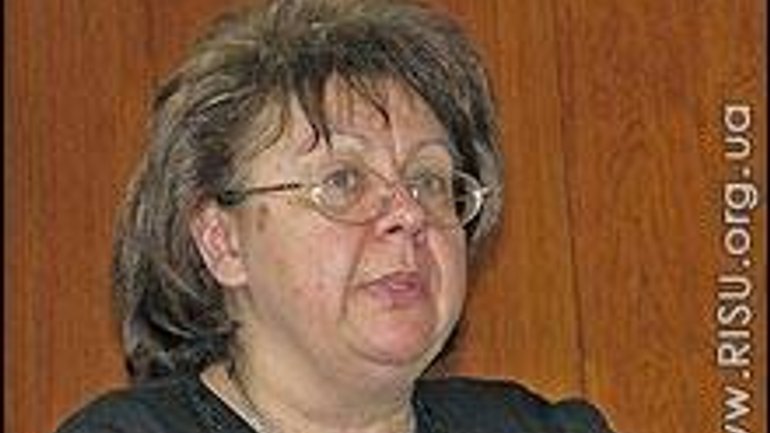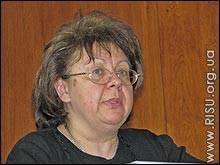“Alternative education in Ukraine: Ideological, conceptual and legal aspects”

 Liudmyla FYLYPOVYCH, doctor of philosophy, head of the Department of Religious Processes in Ukraine at the Institute of Philosophy of the National Academy of Sciences of Ukraine, executive director of the Center of Religious Information and Freedom of the Ukrainian Association of Religious Studies Experts
Liudmyla FYLYPOVYCH, doctor of philosophy, head of the Department of Religious Processes in Ukraine at the Institute of Philosophy of the National Academy of Sciences of Ukraine, executive director of the Center of Religious Information and Freedom of the Ukrainian Association of Religious Studies Experts
The question of reformation of the system of education in Ukraine in the light of the Bologna Process, which determines changes which are experienced by primary and secondary schools, of necessity puts questions about the conceptual reinterpretation of approaches to education before teachers and administrative structures in the sphere of education. The old Soviet system, which in fact is preserved at schools up to this time, in the law on education declaring a right to education does not foresee freedom of choice of this education.
This is why children study at schools for which their parents are able to pay, but not in that place where they would like to. Parents are placed in strict conditions: either to send their child to a public school— sometime they can try to choose a school with a specialization, but this is a privilege of cities— or to a private school, and this is also possible only in large “centers of civilization.”
Knowing about the crisis in the state system of education (the low level of teaching, frequent change of staff, corruption, overcrowded classes, and so on), every thinking family dreams about a private school for their children. However, today’s private school isn’t available for most Ukrainians. First, there are not so many of them (for example, of 527 general education schools in Kyiv, only 44 are private, that is, a little more than 8%). Second, high tuition for studies isn’t possible for everybody, that is minimum of $120 up to $1000 per month for a child.
Lately there is more and more frequent talk about alternative schools in Ukraine, about alternative education, which is not oriented only to the present-day bourgeois but also for the middle class.
In the context of talk about education and religion, alternative education foresees the presence of such a segment as general education schools founded by religious organizations. Given the fact that approximately 70% of the population of Ukraine identifies themselves as believers (mainly Christians), who, according to the Constitution of Ukraine, have the right to educate their children in the spirit of their own world view, principles and religious beliefs, this also means to educate them in general education schools that meet the needs of believing parents concerning the education of their children. Let’s say, if Christians believe in the creation of the world in six days, then they have the right to expect that not only the theory of evolution will be taught at school.
In addition, as a result of sociological monitoring of the state and tendencies of growth of the religiosity of Ukrainian society, and also public opinion concerning the role of religion in public life, according to a survey done in 2007 by the Oleksandr Razumkov Center for Economic and Political Studies, 17.7 % of those surveyed would like to educate their children in a general education school founded by the church, and another 33.8 % would join the supporters of such education if it depended on the level of education in such schools.
That is, more than a half of all Ukrainians support the project of creating alternative education, and namely with a religious basis. Clearly, the majority of the supporters of such an idea are in western Ukraine (respectively 35.8 % and 35.2 %), and the least quantity is in southern Ukraine – only 7% definitely support such a form of education, and again 2.4 % agree to support such an idea, providing there is a high level of education at this kind of schools.
The realization of parents’ rights and the guarantee of freedom of choice of education are not simple questions. On the one hand, there is public necessity, concrete social request. On the other hand, a clear legislative basis for the creation of general education schools by religious organizations is absent.
Today in Ukraine a conflict of laws exists: 1) the law on education, which clearly separates school from church and church from state and 2) the law on freedom of conscience and religious organizations, which does not settle directly the question of creating such kinds of institutions, but also does not forbid their creation. But since the founders of such a school apply to the Ministry of Education and Research when they create it, then that is ruled by the norms of the law on education and not by the norms of the law without profile.
Over 10 years legislators have not resolved this conflicted triangle of “state-education-religion.” Amendments were repeatedly submitted to the current laws concerning concession of a right for religious organizations to found general education schools. But every time either the bill failed or the Parliament was dismissed. Consequently, today in Ukraine any civic organization, let’s say, the “Party of Beer Lovers,” any private person, let’s say, a pilot or a miner, has a right to found a general education school, but religious organization have not. Just that legal nonsense enabled in the past the Society of Mykola Rerikh, the Federations of Professors for Peace (Unification Church), followers of Dianetics (Church of Scientology) to penetrate schools in eastern Ukraine, and the historical churches are left with nothing.
The churches of Ukraine, civic organizations, and educational institutions which realize the need to change the situation which was formed in relations between religion and education, trust that Ukraine will renounce the hard model of separation between school and church and will include the best examples of historical and innovative, foreign and native forms of education into its practice.









